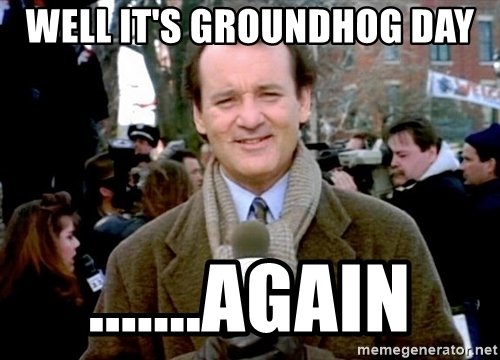Stop Making These Common Tire Mistakes
To quote Phil Connors, Bill Murray’s character in the movie Groundhog Day, “It's the same thing your whole life: ‘Clean up your room. Stand up straight. Pick up your feet. Take it like a man. Be nice to your sister. Don't mix beer and wine, ever.’ Oh yeah: ‘Check your tire’s air pressure everyday. Use the right tires for the job. Don’t buy on price. And don’t wait until the last minute." Okay, we made the last part up, but Groundhog Day resonates with us because we see so many people in the field stuck in a cycle of repeating the same errors. Help us break the loop by stopping these common mistakes.

Rolling out day after day without checking the air
Whether you operate in the field, in a forest, or on a construction site, inflation pressure matters. To maximize the results of your equipment, get in the habit of checking the tire pressure of your machines daily—preferably every morning before the tires get a chance to warm up. On the farm, incorrect tire pressure can affect everything from yields to fuel consumption. On a construction site, the wrong tire pressure can cause problems such as irregular wear and making your tire more susceptible to punctures. Most operators will be shocked to see the benefits that the simple act of maintaining proper tire pressure delivers.
Buying the wrong tires for the job
We make application-specific tires that are purpose built to solve the problems facing our customers. Of course, application-specific tires work best when being used for the application they were designed for. Before purchasing your next set of tires, consider how they will be used, the loads they are going to carry, and what type of terrain they are going to operate on. Picking the right tire can result in better productivity, increased longevity, more profitability, and, ultimately, better overall results.
Buying on price instead of cost-saving features
Although tires today may look the same as their predecessors—they’re still black and round—many of today’s tires offer advancements that help bolster a machine’s performance. On the farm, farmers are turning to tires utilizing IF/VF technology to carry more load and reduce soil compaction. The incorporation of shock-reducing apertures have helped solid tires not only deliver a more comfortable ride, but is one of the reasons for their gaining popularity in puncture-applications fields from demolition to recycling.
Waiting ‘til you’re in trouble to replace.
Almost everyone is guilty of trying to squeeze every last bit of life out of their tires, but this practice can end up costing far more than it saves. Tires at the end of their lifespan no longer perform as well as they did when new, reducing their efficiency and productivity. More so, operating on tires at the end of their life is begging for a failure at the worst possible time, like during harvest, when facing a completion deadline, or while deep in the forest. The cost of new tires looks a lot less expensive compared to a machine being down during a critical time or in an remote location.
 Whether the groundhog predicts that we should brace for a longer winter or if we should start preparing for spring, take a step (watch out, it’s a doozie) toward breaking the cycle of these common tire mistakes and move on to a new, and better, day. Just remember, as Bill Murray says, “the human condition means that we can zone out and forget what the hell we're doing.” Don’t keep letting it happen to you!
Whether the groundhog predicts that we should brace for a longer winter or if we should start preparing for spring, take a step (watch out, it’s a doozie) toward breaking the cycle of these common tire mistakes and move on to a new, and better, day. Just remember, as Bill Murray says, “the human condition means that we can zone out and forget what the hell we're doing.” Don’t keep letting it happen to you!

